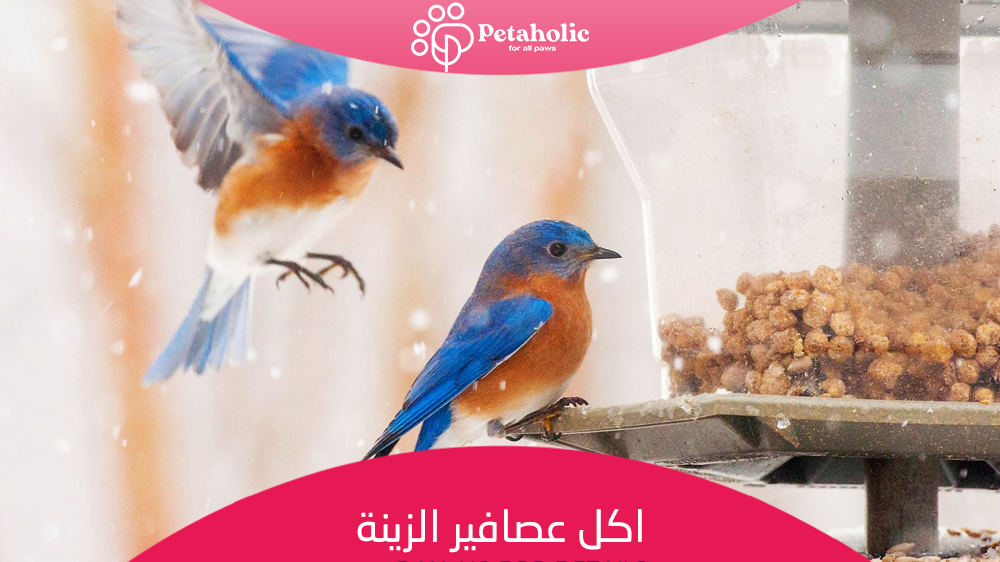
It is very exciting to welcome a new pet bird into your home, introduce it to its new family members, and help it become familiar with its new surroundings. The most important part of caring for ornamental birds is giving them proper nutrition so they can live a happy and healthy life. So, what is healthy and healthy for ornamental birds to eat? Learn more about what foods your birds will enjoy, and how much is appropriate to feed them at mealtime. You will also find in our store a variety of ornamental bird foods suitable for each type at the best prices.
What is a balanced diet and healthy types of food for ornamental birds?
In the wild, finches and other birds eat a variety of foods: seeds, nuts, herbs, flowers, fruits, insects, and the list goes on. The change in seasons brings new types of foods, and birds feed themselves on what is available. At home, birds also feed on what is available, so balanced, natural and complete food must be available. A bird's diet is crucial to its health. Birds on a poor diet will not survive their entire lives and are likely to be exposed to any number of viral, bacterial and fungal infections. A good diet boosts the immune system and helps birds ward off disease. It also keeps the bird in good spirits and its feathers in good condition. Below are the foods of ornamental birds and the most important elements of a balanced diet that you should provide to your ornamental birds from Petaholic .
Seeds and food pellets
Many new bird owners become confused about what to feed their pet birds. Bird seed? Bird pellets? There are so many options and so many opinions. Both seeds and pellets are nutritious foods. One is not necessarily superior to the other, depending on what else you feed the bird along with it. However, veterinarians say birdseed is too high in fat to be a healthy main course for most birds. In fact, excessive intake can lead to health problems and inappropriate behaviors. So offering birdseed to your bird as a treat or snack once in a while is fine, but it's in their best interest to keep this to a minimum to maintain their health. Here is a list of seeds that pet birds typically attract and love:
- Sunflower
- Safflower
- millet
- Hulled and cracked corn
- Peanuts
- Sorghum
- Rapeseed
- Golden millet, red millet, flax, etc
As for bird pellets, they are a good bird food option that can help with those who are picky eaters, and they provide you with peace of mind that your bird is getting the nutrition it needs, as the pellets are supposed to be nutritionally complete. Every bite is packed with nutrients and doesn't allow your bird to pick and choose just his favorite. They also come in a variety of shapes, colors and sizes; Which helps provide variety in the food plate.
Nuts
Nuts are very healthy as one of the best types of food for house finches. Walnuts, in particular, have many nutritional features not found in other nuts. They are also very tasty, and many birds appreciate them as special gifts or even natural foraging toys. Many birds spend time exercising their beak and jaw muscles on the shells of some nuts in an attempt to open them. If they find one of the nuts they can't open, give them some help and use a nutcracker to help crack it.
Fruits and vegetables are among the most important foods for ornamental birds that you should provide to your birds
Fruits and vegetables are great daily snacks, especially nutritious fruits and vegetables, such as those that are dark green or orange. Try various fresh fruits and vegetables to see what your bird likes best. If you have a picky bird, offer fresh foods in a variety of ways: chopped, mashed, whole, shredded, etc. Don't give up too early on feeding a particular nutrient; It may take some time for the bird to feel curious enough to try it. When offering fresh fruits and vegetables to pet birds, make sure they are only available for a few hours in the dish. After that, many fruits and vegetables begin to rot or attract pests. Here is a short list of some nutritious fruits and vegetables you can try. Just make sure to wash each one well before serving it to your bird.
- Apples
- Apricot
- the banana
- Berries
- Cantaloupe
- Cherry
- coconut
- Fig
- Grapes
- Grapefruit
- Kiwi
- Watermelon
- Mango
- Orange
- Papaya
- Peaches
- Pear
- Pineapple
- pomegranate
- raspberry
- the strawberry
- asparagus
- Cooked beans only
- Chickpeas, lentils and soybeans
- Beets
- Broccoli
- carrots
- Cauliflower
- Dandelion
- Cabbage
- Leafy vegetables
- Parsnips
- Peas
- Pepper (red or green hot)
- pumpkin)
- Lettuce
- Spinach
- sweet potato
- tomatoes
- Courgettes
It should be noted that apples and citrus fruits such as oranges, tangerines, and grapefruit should only be fed in small amounts because they are acidic. We strongly suggest avoiding canned fruits and vegetables; Because they contain a high percentage of sugar and salt, they can cause diarrhea and other health problems.
Protein sources
Like humans, birds benefit greatly from feeding on foods containing protein because these nutrients are essential for growth, immunity, and other biological functions. So you will need to be prepared to feed your birds in limited quantities the following:
- Cooked eggs
- Bean mixtures (legumes)
- Tofu and whole grain bread
- Low-fat or fat-free cheese
- Peanut butter (small amounts)
- Seeds
Among the best types of complete, balanced ornamental bird food that we recommend to you from our store:
What foods are strictly prohibited from giving to your birds?
Each bird's food choices may vary greatly, but some foods can wreak havoc on your birds' digestive system. Below are fruits and vegetables that should be completely avoided as they are toxic to birds.
- Avocado: Contains a fungicidal toxin called persin that causes poisoning and develops congestion in birds.
- Rhubarb: The leaves of this plant contain oxalates, which can cause severe kidney problems in humans and birds.
- Onions and garlic: These vegetables are dangerous to pets and birds, especially when a high concentration of garlic is provided to ornamental birds.
Other than these vegetables and fruits, celery stalks, dried beans, caffeine, mushrooms and alcohol are also toxic to birds.
If you want to add the highest quality bird pellets possible to your birds' healthy diet, we recommend:
Ultimately, feeding your bird a healthy diet doesn't have to be expensive or time consuming. Try to provide ornamental birds with a balanced diet that contains all the foods we mentioned in this guide, which are healthy, easy, and full of delicious taste, in addition to beneficial nutrients. You can also explore a group of the finest brands of ornamental bird foods of various types on our store.
You may also be interested in:
- What healthy cockatiel food should I feed my birds?
- What is the appropriate environment in order to properly raise canaries at home?

